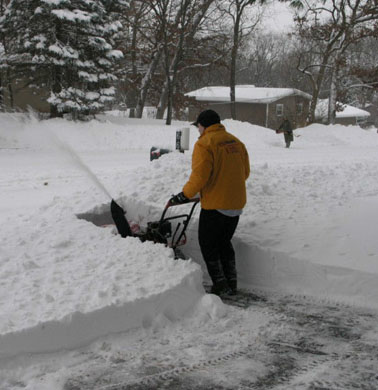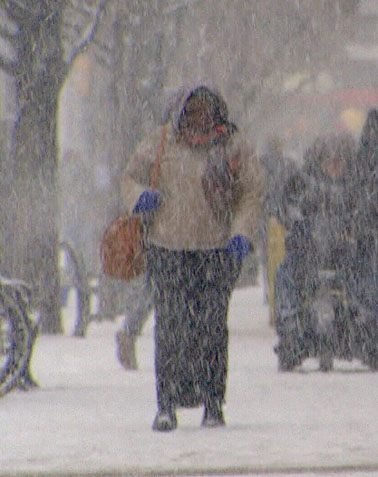Are the Harper Conservatives really en route to improving their re-election chances by leaps and bounds ????
Jan 17th, 2015 | By Randall White | Category: In BriefIf you have been in any way distressed by this past Thursday’s Global News headline on the Canadian federal election this year, Â “Conservatives pull ahead of Liberals, could be on cusp of majority: poll,” take heart. There is at least some countervailing good/bad news.
To start with, the poll in question – which reports Conservatives 35%, Liberals, 31%, NDP 24%, BQ 6%, and Greens and others 4% (“between Jan. 6 and Jan. 11”) – was taken by Ipsos Reid. And this pollster hasn’t exactly had a great track record lately.
Less than a week before this past June’s Ontario election, eg, Ipsos Reid was telling us “PCs (35%), Liberals (35%) in Dead Heat in Ontario Among Decided Voters, But Likely Voters Still Favour Tories (40%) Over Grits (32%) … Most (68%) Ontarians Say It’s Time for Another Party to Take Over.” Â The day before the election Ipsos Reid was saying “Ontario Election a Photo Finish: Among Decided Voters, Liberals (33%) Edge PCs (31%), NDP (30%) in Three-Way Race; But Among Likely Voters, PCs (36%) Have Lead over Liberals (30%) and NDP (30%).”
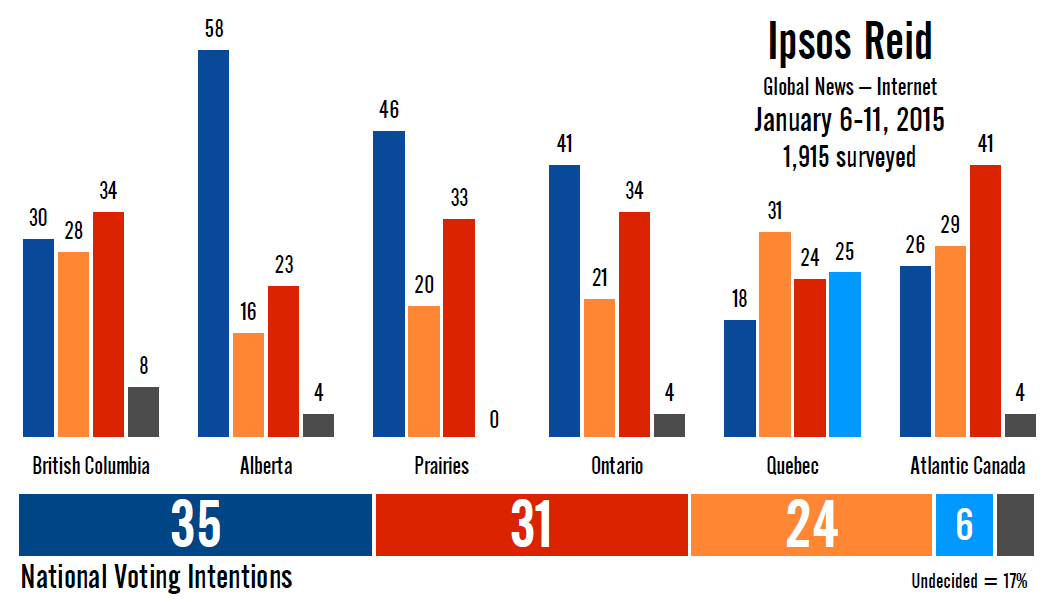
Our thanks as well to Eric Grenier and ThreeHundredEight.com. For those who may have forgotten, Conservatives are blue, Liberals red, New Democrats or NDP orange, Bloc Quebecois light blue, Green and others black.Â
So … how did the final “photo finish” actually finish, when all the votes were counted on the night of June 12? Â Liberals 39% (and a majority government of 58 seats in a 107-seat house), Conservatives 31%, NDP 24%. Â What did Ipsos Reid get right? The Conservative (PC) vote in their very last number for likely and unlikely voters. What did they get wrong? Everything else!
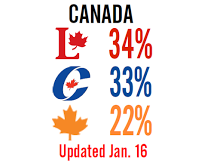
Eric Grenier’s latest polling averages from all corners also still have the Liberals slightly ahead.
As Mr.Nanos explained on January 14 : “The past four weeks have shown a slow erosion for the Conservatives in the Nanos Party Power Index as they continue to trail the Liberals. The federal Liberals registered 57 points out of a possible 100 points on the index followed by the Conservatives at 50 points, the NDP at 50 points, the Green Party at 31 points and the BQ at 27 points (QC only) … The Nanos Party Power Index methodology comprises a basket of political goods that includes ballot preferences, accessible voters, preferred PM views and evaluations of the leaders.”
1. “The two most successful leaders in contemporary western politics are Angela Merkel and Stephen Harper” ????
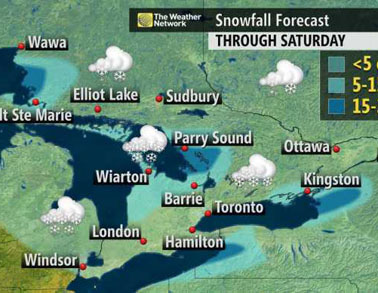
How this part of Canada will vote in the 2015 federal election could have a lot to do with who finally wins and loses what.
All this having been said, Ipsos Reid’s  “Conservatives pull ahead of Liberals, could be on cusp of majority: poll” does seem not entirely inconsistent with a thread that has been growing at least somewhat thicker since the fall of 2014.
My own first wake-up call here came on an early October airplane. As I think I may have noted elsewhere (several times?), I was almost astounded to read, in an article by an eminent British political scientist in a British political magazine, that : “The two most successful leaders in contemporary western politics are Angela Merkel and Stephen Harper, neither of whom is famous for having an extensive hinterland (Merkel likes football, Harper likes ice hockey). Both have been subject to widespread disdain for their perceived lack of broader political vision, but both have ridden out the mockery.”
If I were Steven Harper and the Cambridge political theorist David Runciman said something like this about me, I’d start to look a lot more confident about my future too. (Oh, and btw, David Runciman is also “married to the food writer Bee Wilson” and, possibly even more significantly, “heir to his family’s Viscountcy.” And if you absolutely must pursue the intriguing sidebar of the modern Runciman aristocrats, in a former mother country of both Canada and the United States, the Wikipedia article on “Viscount Runciman of Doxford” would probably be a start.)
And then there was supporting President Obama in Iraq – an issue which both the Liberals and New Democrats got wrong, albeit in their own distinctively progressive ways. And PM Harper got right. (He is courageous enough to face the plain truth that President Obama, right or left, is still more popular in Canada than he is.)
And then there was a column by one-time Harperland critic Lawrence Martin in the Globe and Mail, on November 18, 2014 : “A pro-active PM seizes the agenda … Â If victory goes to the guy who wants it most, Stephen Harper is making a good case for another crowning. The Prime Minister has been on a roll lately, moving at whirlwind speed both at home and abroad. He has had his best month in a long, long time. He is dominating the news agenda, leaving opposition leaders in the shadows.”
Now, on January 16, 2015, we also have polling guru Eric Grenier, taking a closer look at the latest Ipsos Reid poll, under the headline : “Breakthrough or outlier? … A new poll suggests that the Conservatives have moved into the lead in national voting intentions, opening up a four-point edge over the Liberals. Is this poll a sign that the Conservatives are in the midst of a breakthrough as this election year begins, or is it an outlier poll that will soon be corrected by a regression towards the mean? And does the poll really put the Conservatives on the ‘cusp of a majority’?”
2. “What first looks like an outlier can be the first to capture a trend …” ????

Grange Park in downtown Toronto (with late 19th century home of former Oxford Regius Professor Goldwin Smith, “the Sage of the Grange,” in background), Wednesday, March 12, 2014. Chris Kitching / CP24.
Mr Grenier has some critical things to say about the Jan 6—11, 2015 Ipsos Reid poll – things that might suggest it just may be more of an outlier than a sign of the times. Â Eg :
* “The Conservatives have not registered 35% support in any poll since February 2013, two months before Justin Trudeau became Liberal leader.”
* Though it sampled “1,915 Canadians,” the “poll had an over-sample in Alberta (which would  be corrected by weighting, of course), making the other regional samples more like a national poll of some 1,200 decided voters.”
* “The poll also had some surprising results on the gender split” between men and women … For the Liberals to score worse among women than among men [as this latest Ipsos Reid poll suggests] is … contrary to virtually every poll done in recent memory.”
* “The score for the Bloc Québécois in Quebec is also noteworthy, as the party was placed in second with 25% support. That is their best performance in any poll since March of last year, some 50 polls ago.”
At the same time, Eric Grenier also believes that “whenever a poll comes out that raises some eyebrows, the reaction should be caution and patience rather than skepticism … What first looks like an outlier can be the first to capture a trend, like that CROP poll in the 2011 federal election that was the first to show the NDP in front in Quebec.”
Mr. Grenier goes on : “And this is not the only poll to show the Conservatives in such a good position. Angus Reid’s mid-December poll put the Liberals and Conservatives in a tie at 34% apiece. Abacus Data’s pre-Christmas poll put the Conservatives ahead by one point, with 34% to 33% support. In the context of those two surveys, a 35% to 31% split does not look unusual.”
At the same time again, Eric Grenier writes as well : “The claim that it [ie the Conservatives’ apparent new 35% of the Canada-wide vote] would put the Conservatives on the cusp of a majority government [because as Ipsos Reid has argued there are 30 new seats] is more unusual.”
And he goes on here with : “Adding 30 seats to the electoral map does not change the math so drastically that the traditionally required 38% to 40% support for a majority government has suddenly been cut to just 35%. I recently looked at the thresholds required for a majority government, and the Conservative number still came in at 38% … By my reckoning, the Conservatives would instead win about 145 seats, falling 25 short of a majority government.”
Mr. Grenier ends his ruminations on the latest Ipsos Reid poll with a few nicely balanced sentences : “I don’t think people should get carried away with the idea of an impending Conservative majority just yet, but the Ipsos poll does suggest the Conservatives could be en route to improving their re-election chances by leaps and bounds. The next polls will be revealing.” And for the time being I’m happy enough to say amen to that.
L’envoi
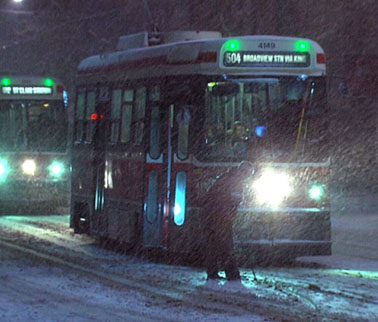 (A) EXTRAORDINARY TIMES IN CANADA : If the prospect that the Conservatives could be en route to improving their re-election chances by leaps and bounds still worries you (and I confess it still worries me), you will be interested in Susanna Kelley’s provocative and nicely written call from the high ground, on  ontarionewswatch.com, “These Are Extraordinary Times: Charlie Hebdo, Ontario, Stephen Harper, And Journalism …  The 2015 federal election has begun. Now is the time to take a long, hard look at what Mr. Harper has done, and an equally long hard look at what Thomas Mulcair and Justin Trudeau would do if they took his place …”
(A) EXTRAORDINARY TIMES IN CANADA : If the prospect that the Conservatives could be en route to improving their re-election chances by leaps and bounds still worries you (and I confess it still worries me), you will be interested in Susanna Kelley’s provocative and nicely written call from the high ground, on  ontarionewswatch.com, “These Are Extraordinary Times: Charlie Hebdo, Ontario, Stephen Harper, And Journalism …  The 2015 federal election has begun. Now is the time to take a long, hard look at what Mr. Harper has done, and an equally long hard look at what Thomas Mulcair and Justin Trudeau would do if they took his place …”
(B) Â EXTRAORDINARY TIMES IN THE GLOBAL VILLAGE : If “it’s the economy stupid” remains the key message, we also seem to be headed for some kind of strange joyride in the global village over the next while. Yesterday the lovely Frances Horodelski at BNN introduced us to the latest trauma, propagated by something as seemingly safe and boring as the Swiss National Bank. See her “Build your bunker … Everyone has an opinion, but I especially liked this one on the move from the Swiss National Bank yesterday from blogger Bruce Krasting: ‘We’ve just taken a huge leap into chaos. The linchpin of the capital markets has been the trust in the CBs. The market’s anchors have now been tossed overboard.’”
“CB s” here just means “Central Banks,” the big case in point at the moment being the Swiss National Bank. As explained by thepeoplesvoice.org : “Yesterday, Switzerland’s central bank (SNB) stunned markets. Scrapping a three-year euro/franc peg. Sending the Swiss currency soaring against the euro … Hammering Swiss stocks on fears of harming the nation’s export-dependent economy. Especially to Eurozone countries … Days earlier, SNB officials called the 1.20 euro/franc cap a policy cornerstone. No longer. The Swiss franc spiked 30% before giving back some gains.”
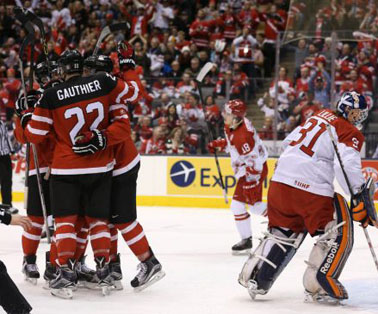
Remembering Team Canada at the World Junior Championships 2015. Gold for Canada in the end. STEVE RUSSELL / TORONTO STAR.
Blogger Bruce Krasting himself provides some further scary details (if you like getting scared about these things) : “We have just witnessed the collapse of a promise by a major central bank … The Fed, Bank of Japan, ECB, SNB and other Central Banks have repeatedly made the same promises over the past half decade: ‘Don’t worry! We are here. We will do anything it takes to achieve the stability we desire. We are stronger than the markets. We can overwhelm all forces. We will never let go — just trust us!’ … I never believed in these promises, but the vast majority of those who are active in financial markets did. The entire world has signed onto the notion that Central Banks are all powerful. We now have evidence that they are not … Anyone who continues to believes in the All Powerful CB after today is a fool.”
Mmmmmmmmmm …
To be continued, no doubt. (And what impact will all this have on the Canadian federal election of 2015? Who knows? But many of us are still interested! Â And that seems to be the main thing.)
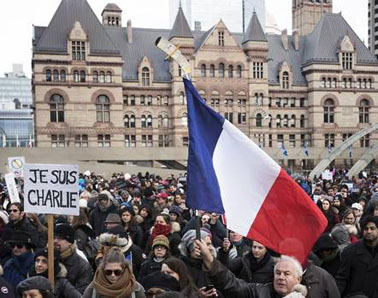
Man uses hockey stick as flag pole as hundreds of people hold a moment of silence for the victims of the recent French terrorist attacks during a demonstration of support for free speech in Toronto on Sunday, January 11, 2015. (Darren Calabrese/THE CANADIAN PRESS.)
PS : I can’t resist noting this final report, which appeared on the Globe and Mail website late last Sunday : “Canadians told to prepare for lengthy battle against terrorism … SEAN FINE … Canadians need to gird for a long battle against terrorism while maintaining their unity and not singling out any religious groups for blame, Mayor John Tory and federal Finance Minister Joe Oliver told several hundred people demonstrating on a cold Sunday afternoon at Nathan Phillips Square in Toronto … Randall White, of Toronto, said he attended because ‘I felt it was important to support the people of France and the values that we share – freedom of expression – when they’re under such challenge in various parts of the world.’”
(At least I’m not also including a photo of myself here. But for those on staff and elsewhere who may have doubted, this is proof that I did attend Florent Guérard’s “Official rally in solidarity after the terror attacks in France / Rassemblement de solidarité après les attaques terroristes en France,” on Sunday, January 11 at 2:00pm, at Nathan Phillips Square in Toronto, Ontario, as noted earlier on this website.)

